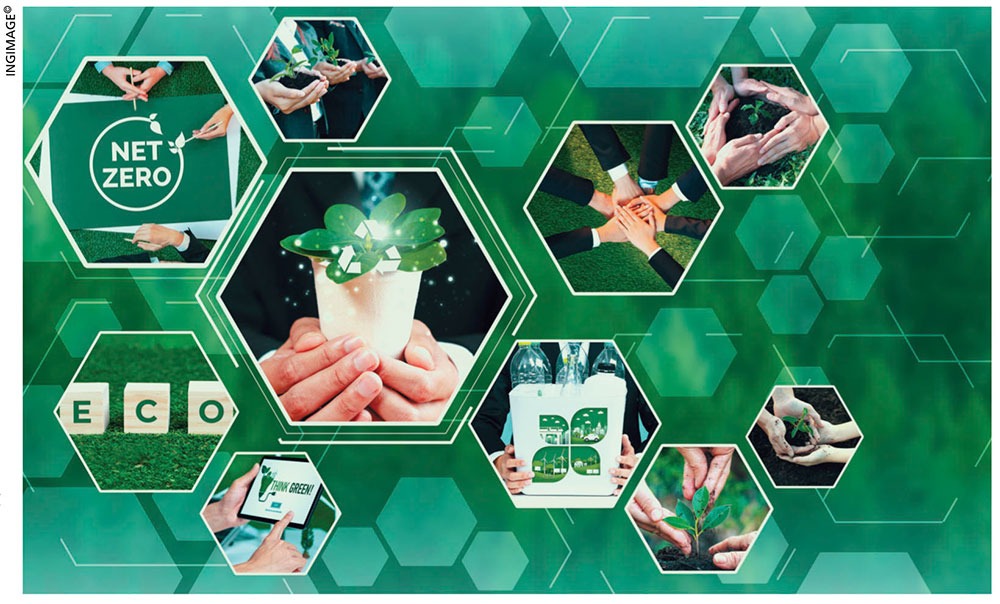BUSINESS STRATEGY

GROWTH CATALYSTS FOR SMEs
Dr. Muneer Muhamed explains how SMEs can adopt sustainability practices

Sustainability has evolved from being a buzzword into a critical business strategy for large and small enterprises. SMEs may be more agile but they face challenges when integrating sustainability into their growth agenda.
So what does this mean for those who are on a growth trajectory?
Essentially, it’s a commitment to long-term success while considering environmental, social and economic factors. It involves balancing profitability with responsibility while making decisions that drive financial growth, and contribute positively to the environment, society and stakeholder wellbeing.
Sustainability matters for many reasons. It enhances competitiveness by appealing to conscientious consumers who desire eco-friendly and socially responsible products; and it can also be a brand differentiator.
Regulators will place greater scrutiny on sustainability, particularly since the UN also has mandated this. Addressing environmental and social risks early will prevent future liabilities, regulatory penalties and reputational damage.
Measures such as energy efficiency, carbon footprints and waste reduction will lead to cost savings over time, and improve resilience. Enterprises will also find it easier to secure funding from impact investors and financial institutions.
As Sri Lanka embraces sustainable development, small and medium-size enterprises will play a crucial role in the nation’s growth agenda, and need to align with the law to avoid legal issues and fines, as well as ensure business continuity.
Here are some sustainability examples that SMEs can embrace…
Install solar panels to harness renewable energy, and reduce electricity costs and carbon emissions.
Use eco-friendly packaging such as biodegradable materials or reusable packaging. This will appeal to eco-conscious consumers.
Engage with local communities by investing in skills development, healthcare and education.
Ensure that raw materials are sourced ethically and sustainably.
Invest in energy efficient equipment and practices, to reduce one’s carbon footprint and operational costs.
Implement waste reduction strategies such as recycling, reusing materials and curtailing packaging.
Indeed, there’s a multitude of challenges that can hamper easy adoption of sustainability practices by local SMEs.
Firstly, they have limited financial and human resources, which can make it hard to invest in many sustainable initiatives.
Secondly, many lack awareness of sustainable practices and their potential benefits. Education and training will take time.
Thirdly, understanding and complying with environmental, social and governance (ESG) regulations can be daunting for small enterprises.
Fourthly, there are supply chain complexities. SMEs may face challenges in implementing sustainable practices throughout their supply chains – especially when dealing with larger, less sustainable partners.
And finally, access to funding is still an issue for SMEs despite promises by the government. Securing financing for sustainable projects is still difficult because traditional lenders don’t fully understand the potential benefits.
The following case studies will help readers understand sustainable growth…
Firstly, the Waste-to-Energy Power Plant in Kerawalapitiya converts municipal solid waste into electricity. This large-scale initiative has created opportunities for smaller local SMEs through waste collection, recycling and supply chain services, and demonstrates how clean energy can open new avenues for SME participation in sustainability.
Meanwhile, Dilmah Tea has embedded sustainability in its core operations by investing in biodiversity conservation, renewable energy and community development through the MJF Charitable Foundation.
Beyond being a major enterprise, Dilmah has also influenced numerous SMEs in its supply chain, particularly tea smallholders, to promote fair trade practices and environmentally responsible cultivation.
Outdoor apparel company Patagonia operates as a Certified B Corporation (B Corp) that’s committed to environmental and social responsibilities. Despite being a larger entity, its ethos of sustainability and transparency are valuable examples for SMEs.
Patagonia donates a percentage of its profits to environmental causes, and promotes repairability and reusability of its products.
Cleaning products company Method implements transparent and efficient practices that SMEs can follow. It uses eco-friendly packaging and biodegradable ingredients, and promotes refillable products.
Method’s focus on sustainability has attracted environmentally conscious consumers who contribute to its growth.
Sustainability isn’t simply about being environmentally responsible. It’s also ensuring long-term viability and growth while contributing positively to a nation’s sustainable development goals.
By aligning growth with responsibility, Sri Lankan enterprises can become catalysts for a sustainable and prosperous future.
Sustainability matters for many reasons





